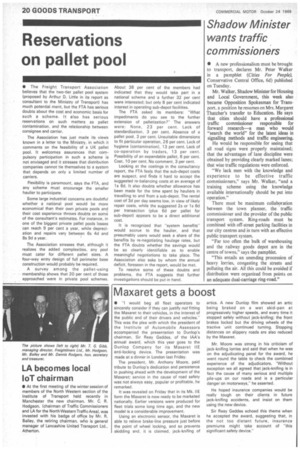Reservations on pallet pool
Page 22

If you've noticed an error in this article please click here to report it so we can fix it.
• The Freight Transport Association believes that the two-tier pallet pool system (proposed by Arthur D. Little in its report as consultant to the Ministry of Transport) has much potential merit, but the FTA has serious doubts about the cost and economic basis for such a scheme. It also has serious reservations on such matters as pallet contamination, and the relationship between consignee and carrier.
The Association has just made its views known in a letter to the Ministry, in which it comments on the feasibility of a UK pallet pool. It welcomes assurances that compulsory participation in such a scheme is not envisaged and it stresses that distribution companies cannot tie themselves to a system that depends on only a limited number of carriers.
Flexibility is paramount, says the FTA, and any scheme must encourage the smaller haulier to participate.
Some large industrial concerns are doubtful whether a natibnal pool would be more economical than their own private pools and their cost experience throws doubts on some of the consultant's estimates. For instance, in one of the biggest private pallet pools losses can reach 9 per cent a year, while depreciation and repairs vary between 6s 4d and 8s 9d a year.
The Association stresses that, although it realizes the added complexities, any pool must cater for different pallet sizes. A four-way entry design of full perimeter base construction would probably be required.
A survey arnong the pallet-using membership shows that 20 per cent of those approached were in private pool schemes. About 38 per cent of the members had indicated that they would take part in a national scheme and a further 32 per cent were interested; but only 8 per cent indicated interest in operating sub-depot facilities.
The FTA asked its members: -What impediments do you see to the further extension of palletization?" The answers were: None, 23 per cent. Lack of standardization, 3 per cent. Absence of a pallet pool, 3 per cent. Unsuitable dimensions to fit particular operation, 26 per cent, Lack of hygiene (contamination), 13 per cent. Lack of co-operation by traders, 13 per cent. Possibility of an expendable pallet, 6 per cent. Cost, 10 per cent. No comment, 3 per cent.
Looking at the castings in the consultancy report, the FTA feels that the sub-depot costs are suspect, and finds it hard to accept the suggested re-balancing costs at an average of 1s 6d. It also doubts whether allowance has been made for the time spent by hauliers in travelling to and from a sub-depot. The rental cost of 3c1 per day seems low, in view of likely repair costs, while the suggested 2s or 1s fid per transaction (plus 6d per pallet for sub-depot) appears to be a direct additional cost.
It is recognized that "system benefits" would accrue to the haulier, and that presumably users would seek a share of the benefits by re-negotiating haulage rates, but the FTA doubts whether the savings would be so clearly identifiable as to enable meaningful negotiations to take place. The Association also asks by whom the annual deficit, foreseen in the report, would be met.
To resolve some of these doubts and problems, the FTA suggests that further investigations should be put in hand.




















































































































